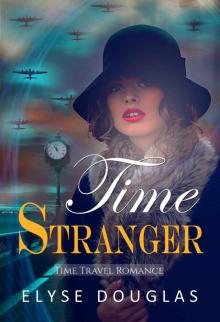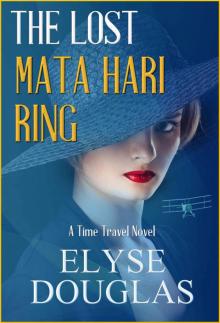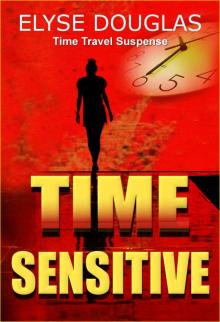- Home
- Elyse Douglas
The Lost Mata Hari Ring
The Lost Mata Hari Ring Read online
Table of Contents
THE LOST MATA HARI RING A Time Travel Novel
Copyright
To the Reader
Acknowledgement
Dedication
CHAPTER 1
CHAPTER 2
CHAPTER 3
CHAPTER 4
CHAPTER 5
CHAPTER 6
CHAPTER 7
CHAPTER 8
CHAPTER 9
CHAPTER 10
CHAPTER 11
CHAPTER 12
CHAPTER 13
CHAPTER 14
CHAPTER 15
CHAPTER 16
CHAPTER 17
CHAPTER 18
CHAPTER 19
CHAPTER 20
CHAPTER 21
CHAPTER 22
CHAPTER 23
CHAPTER 24
CHAPTER 25
CHAPTER 26
CHAPTER 27
CHAPTER 28
CHAPTER 29
CHAPTER 30
CHAPTER 31
CHAPTER 32
CHAPTER 33
CHAPTER 34
CHAPTER 35
CHAPTER 36
CHAPTER 37
CHAPTER 38
CHAPTER 39
CHAPTER 40
EPILOGUE
Thank You
THE LOST MATA HARI RING
A Time Travel Novel
By
Elyse Douglas
Copyright
The Lost Mata Hari Ring
Copyright © 2018 by Elyse Douglas
All Rights Reserved
This is a work of fiction. Names, characters, places and incidents are either the product of the author’s imagination or are used fictitiously. Any resemblance to actual persons, living or dead, events, or locales is entirely coincidental.
The copying, reproduction and distribution of this book via any means, without permission of the author, is illegal and punishable by law. Your support of the author’s intellectual property rights is greatly appreciated.
To the Reader
Wherever it was appropriate, and served the plot, the dialogue spoken by Mata Hari and Pablo Picasso were taken directly from quotes, letters, diaries and postcards. Although most of the novel follows the historical record about Mata Hari’s life from 1916/1917, certain changes were made for convenience of time and plot.
Acknowledgement
We would like to express our gratitude to Hans Groeneweg, Lid projectgroep Mata Hari, of the Fries Museum in Leeuwarden, Friesland in the Netherlands, for his invaluable help as we researched the life of Mata Hari and her daughter, Juana-Luisa MacLeod.
We would also like to thank Liesse-Marie Slemon for her invaluable help, patience and insight.
Dedication
For Neelima, always the Muse, whose mysteries are timeless.
CHAPTER 1
With a certain unease and reluctance, twenty-nine-year-old Tracey Peyton Rutland entered Maynard Hopkins’ private, sunny office on East 78th Street. Dr. Hopkins closed the door softly behind her, clearing his throat.
“Good morning. May I take your coat?” he offered.
Tracey shouldered out of her long, stylish winter coat, peeled off her leather gloves, stuffed them into her coat pocket and handed the coat to the doctor, who hung it in a closet.
A tall, thin man in his middle 70s, with stooped shoulders, Dr. Hopkins had clear, steady eyes and thinning white hair, combed sideways. He wore a crisp white shirt, dress pants, and spectacles that lent an impression of intelligence and wisdom.
After closing the closet door, he turned to her. “Ms. Rutland,” he said in a thin tenor voice, “can I get you anything? Water? Tea? Coffee?”
Tracey gave him a quick, friendly smile. “No, thank you. And please call me Trace, Dr. Hopkins. It’s short for Tracey.”
He nodded in agreement, noting Trace’s slight southern accent. He indicated toward his plush leather couch. “Please sit down so we can have a little talk before we begin.”
It was a rectangular office—a private room connected to his 24th floor two-bedroom apartment. Trace lowered herself onto the couch and folded her hands on her lap. As she took in the room, she saw an ornately carved oak desk, with an open laptop computer and papers neatly arranged on it. A vase of fresh flowers bloomed next to a gold-framed color photograph of a broad-faced older woman, whose smile was generous, eyes dark and hair a silver gray. There were floor-to-ceiling bookshelves, filled to capacity; floor plants, all green and healthy; and silver-framed engravings on the exposed walls. They featured familiar photos of the Brooklyn Bridge, the Empire State Building and the 42nd Street New York Public Library. Trace’s eyes finally rested on the psychiatrist’s couch, with its black leather upholstery and ebonized wood claw feet. Was that her ultimate destination?
Dr. Hopkins drew up a ladderback chair and sat opposite her, a legal pad, some typed pages and a pen at the ready. “And how are you, on this chilly January morning, Trace?”
“I’m well, Dr. Hopkins, thank you.”
He adjusted his glasses. “You were referred by Dr. Margaret Cummins, is that right?”
“Yes.”
“And she is your primary care physician?”
“Yes.”
“And you are a dancer, singer, actress?”
“Yes.”
Dr. Hopkins produced a thin smile. “Have you been in any shows I might have seen? I’m quite fond of the theatre.”
Trace tried to keep the pride out of her voice. “I’ve been in The King and I and On the Town, and I played Christine in The Phantom of the Opera for about a year. I’ve also done some TV, a movie for Netflix, and had a few minor parts in other feature films. I also had a part in a TV series two years ago called Happy Ever After, You Fool.” She smiled. “Believe it or not, it was a family drama.”
“Well, that’s very impressive,” Dr. Hopkins said, with a lift of an eyebrow. “It sounds like you’re doing quite well in your chosen profession.”
Trace smiled, demurely. “I hope so. I’m between shows right now. I’ll be starting rehearsals for a new musical in a few weeks, in February.”
As she spoke, Dr. Hopkins studied her in earnest. Trace Rutland was a very attractive young woman, with long, honey blonde hair, startling blue eyes, a delicate mouth and high cheekbones. Her figure was fine, waist thin, neck long and elegant, skin white and radiant. When she'd entered, he'd guessed her height to be about 5 feet 10 inches, only three inches shorter than he. Yes, Trace would be a striking figure on the stage.
He shuffled some of the typed pages, found what he was looking for and drew one out, quickly perusing it. “On the questionnaire you filled out, you stated that you saw a psychiatrist for about two years… a Dr. Alma Steinmetz?”
“Yes, that’s right,” Trace said, unfolding her hands and picking a piece of lint from her V neck, emerald-colored sweater. She then readjusted herself on the couch, tugging gently at her tight designer jeans, feeling an acid stomach.
Dr. Hopkins lifted his eyes. “Over the phone last week when we talked, you said Dr. Steinmetz was a more traditional psychiatrist. That is to say, her treatment recommended lifestyle changes, in addition to pharmacological treatment and group therapy. You stated that she did not use hypnotherapy.”
“That’s right. But after two years, I didn’t feel like we were making much progress. Also, I stopped taking the medications she prescribed, and that went against Dr. Steinmetz’s recommendations. So, I decided to make a change. Dr. Cummins told me that you have had some success in treating patients with psychosomatic symptoms and insomnia, and that you sometimes use hypnotherapy.”
Dr. Hopkins nodded. “Yes, in some cases. But I also prescribe medications, Trace, dependi
ng on my patient’s symptoms.”
“I’d rather not take any medications right now, Dr. Hopkins. When I take them, I feel out of touch with myself, and I don’t perform as well. I feel dizzy sometimes and, I don’t know, sort of strange.”
“Did Dr. Steinmetz try adjusting your medications?”
“Yes, but I had almost all the same reactions each time. I’ve never tolerated medication very well.”
“All right, Trace. Fine.”
Dr. Hopkins sat up a little straighter and nodded again. “So you have persistent nightmares and often feel pains in your chest, is that correct?”
“Yes.”
“Have you undergone testing for these complaints?”
“Yes. I have had every test there is, from EKGs to X-rays, CT scans, blood tests, and angiograms. I’ve taken sleeping pills for years, but then I stopped because I was afraid I was getting addicted, and then I started drinking wine to help me sleep. When you do eight shows a week, you have to sleep or you’re just dead on Monday, your day off. As it is, I have to sleep all day on Monday, just to have the energy for the next week’s performances.”
Dr. Hopkins observed her as they spoke. Trace’s hands would form fists, then she’d relax them for a time, then form the fists again. He wondered if this was some relaxation technique she’d learned or if it was related to nerves. He also observed a muscle twitching near her left eye. Her beautiful eyes did look glassy from fatigue, although her expert makeup job hid most of the lines and signs of weariness.
Trace’s eyes ventured toward the windows. She saw a shaft of sunlight illumine the beauty of the Doctor’s oak desk. Her face changed into sadness.
“Dr. Hopkins, I’m getting desperate. I can’t keep going on like this… always tired, always frightened I’m going to fall asleep and have the same nightmare. I’ve had it, on and off, since I was a girl. When I have that nightmare, I jerk awake and I can’t go back to sleep. It’s just so terrifying. Sometimes when I’m on stage dancing or singing, I feel a hot searing pain in my chest, and it nearly knocks the wind out of me. I almost fainted the other night on stage. I just have to find some way to cope with all this, without taking pills. Sometimes I feel like I’m going to crack up. I don’t want to get addicted and I don’t want to become an alcoholic, because the only way I can fall asleep now is to drink three glasses of wine every night.”
Dr. Hopkins pursed his lips and leaned back. “Trace, how often do these nightmares occur?”
Trace faced him. “Maybe four times a month, sometimes less, sometimes more.”
“And it’s the same nightmare—I mean to say—the events are exactly the same in each nightmare?”
“Yes, pretty much. Sometimes I’ll see more events and faces, sometimes less, but it’s always pretty much the same.”
“And when did you first recall them occurring…approximately at what age?”
Trace lowered her eyes in thought. “I guess I was about five or six. Mom or Dad used to rush into my bedroom because I was screaming. I’d tell them about the nightmare and they’d comfort me and tell me it was all just a dream, and to go back to sleep.”
Trace continued. “The nightmares went away for a while when I was in high school, but they returned again when I started college. I lost roommates, because I would wake up screaming in the middle of the night. I finally had to get my own room. The university doctor prescribed some medications and they suppressed the dreams for a while, but I always felt a little out of it, and dreamy. I had boyfriends who called me Space Girl.”
Dr. Hopkins scribbled notes, nodding absently as he wrote and listened. Finally, he lowered his pen and crossed his long legs. “Trace, have you ever been treated with hypnotherapy?”
“Once, about four years ago, when I was in Los Angeles. I was working on a movie, and the nightmares got really bad.”
“And how did you respond to it?”
“I guess I’m not a very good candidate. I felt relaxed, but I didn’t go very deep. I remembered a few things from my childhood, but nothing much more than that.”
Dr. Hopkins noted her response on his pad, and then he lifted his eyes toward the ceiling, as if in thought. “Trace, can you tell me about your persistent nightmare? Are you comfortable doing that?”
Trace licked her lips, eyes blinking rapidly. She sighed, hesitating. “Yes…” she said, glancing away toward the windows again. “But sometimes it makes me a little sick to talk about it. That’s why I don’t talk about it. Talking about it just, I don’t know, hurts, and it’s scary.”
“Okay, Trace. Have you talked about it with other doctors?”
“Yes… Dr. Steinmetz and I worked to identify certain aspects of it. She believed the dream held buried parts of myself…the shadow parts of myself, that I didn’t want to face.”
“Did you improve? Did the nightmares subside?”
Trace shifted uncomfortably and raked fingers through her lush hair. She shrugged. “Maybe. The nightmares went away for a while—maybe a month or two—and I thought they were gone—but then they came back. They always come back, and sometimes they come in a kind of kaleidoscope of images and memory, all spinning around.”
“Okay, I see. Trace, I want you to relax and take a few deep breaths. Would you like some water?”
“No… I’m fine.”
“Okay, just sit back with your hands at your sides and, when you’re ready, I want you to close your eyes and tell me about your nightmare. Is that all right? Can you do that?”
Trace nodded, and Dr. Hopkins saw tension form around her mouth and eyes.
“Just take a few deep breaths, Trace. Relax.”
She did so and closed her eyes.
Immediately, Trace saw images and motion. She smelled a foul odor, felt cold and frightened. She began to shiver.
“Are you all right, Trace?”
Trace felt a cold hand of resistance pushing her away. But she was desperate for help. She struggled to follow the images as shadows fled down dark, dank hallways, and angry sinister faces jutted out from walls, shouting her name. She struggled to pierce the darkness and push through the terror, but she couldn’t.
Her eyes popped open. “I can’t,” she said in a trembling voice. “I just can’t. It makes me sick and scared. I can’t.”
Dr. Hopkins lowered his voice to a comforting whisper. “It’s all right, Trace. It’s fine. Just relax now. Just take some easy, comfortable breaths.”
They sat in a long pulsing silence. Outside, Trace could hear the murmur of the City, distant taxi horns, a helicopter passing over, the wings of a pigeon flapping by.
Dr. Hopkins uncrossed his legs and leaned forward. “Trace, I’d like to try hypnotherapy now, if you are agreeable.”
Trace looked at him with nerves and hope. “Okay…”
“I want to hypnotize you, to do some gentle exploration. Now I realize you’ve done this before, but I would like to try it again—but only if you feel comfortable with that.”
Trace flashed him a brief twitch of a smile. She lifted her shoulders and let them slowly relax. “Well…that’s why I’m here, Dr. Hopkins, to try to get at this thing and release it. I just hope it works better than last time.”
Dr. Hopkins smiled reassuringly. “Let’s give it a try. I believe it might help us understand you better. Of course, it may not. As you know, not everyone responds to hypnosis.”
“Right, but I’m willing to try,” Trace said. “I’ll try anything.”
Minutes later, Trace was lying on the black leather psychiatrist’s couch, covered by a light cotton blanket, her eyes open, focused on the white ceiling. Dr. Hopkins had lowered the lights and closed the draperies to shut out the late morning sun.
He returned to Trace and adjusted his chair so that he sat beside her. He quietly led her through a series of relaxation techniques that allowed her to go deeper within, until her eyes fluttered closed and her breathing deepened.
“How do you feel, Trace?”
“Good…warm.
”
“All right, very good. Now let’s go even deeper.”
Trace’s breathing was slow and even, her body peaceful, her mind quiet. It was as if she had dropped below the surface of a calm lake, drifting down into a peaceful awareness, not asleep, but hovering softly on the periphery of consciousness, where all the static of her everyday conscious mind was dwindling away.
“All right, Trace, I want you to listen to the sound of my voice and only my voice. No other sounds will disturb or distract you. Okay?”
“Okay…”
“What is your full name?”
“Tracey Peyton Rutland.”
“Where were you born?”
“In Lexington, Kentucky.”
“Okay, Trace… I want you to drift back and see yourself as an eight-year-old child. Go to a beautiful day and to a pleasant memory, and just tell me what you see and feel.”
Trace cleared her throat, and when she spoke, her voice took on a girlish quality.
“I’m…well, I’m outside on a hot, sunny day. Bobby and I are down by the pond, diving and swimming off the wooden pier. Bobby is doing cannon balls and he flaps around like a wild duck, cackling and making quacking sounds.”
“And who is Bobby, Trace?”
“He’s my older brother. He’s so silly. He makes me laugh. He makes me scream with laughter, because his legs are so skinny, and he makes ugly faces at me.”
“Okay, Trace, very good. Very nice. How do you feel?”
“I feel good. I’m happy. On the patio, my mother and father are sitting in chairs, sipping iced tea out of big, frosted glasses.”
Trace smiled. “It is such a wonderful day…except for the pains in my chest. I started feeling them again this morning, after I had that bad dream. It was really scary.”
“Oh? And why are you feeling pains there, Trace? Are you sick?”
“No, I’m not sick at all. It’s just that sometimes after I have that bad dream, I feel pains in my chest for a while.”
“Did you tell your parents about the pains and the bad dreams?”
“Yeah...”

 The Christmas Women
The Christmas Women Time Stranger
Time Stranger The Lost Mata Hari Ring
The Lost Mata Hari Ring Time Sensitive
Time Sensitive The Christmas Eve Daughter - A Time Travel Novel: The Sequel to The Christmas Eve Letter
The Christmas Eve Daughter - A Time Travel Novel: The Sequel to The Christmas Eve Letter The Date Before Christmas: A Novel
The Date Before Christmas: A Novel